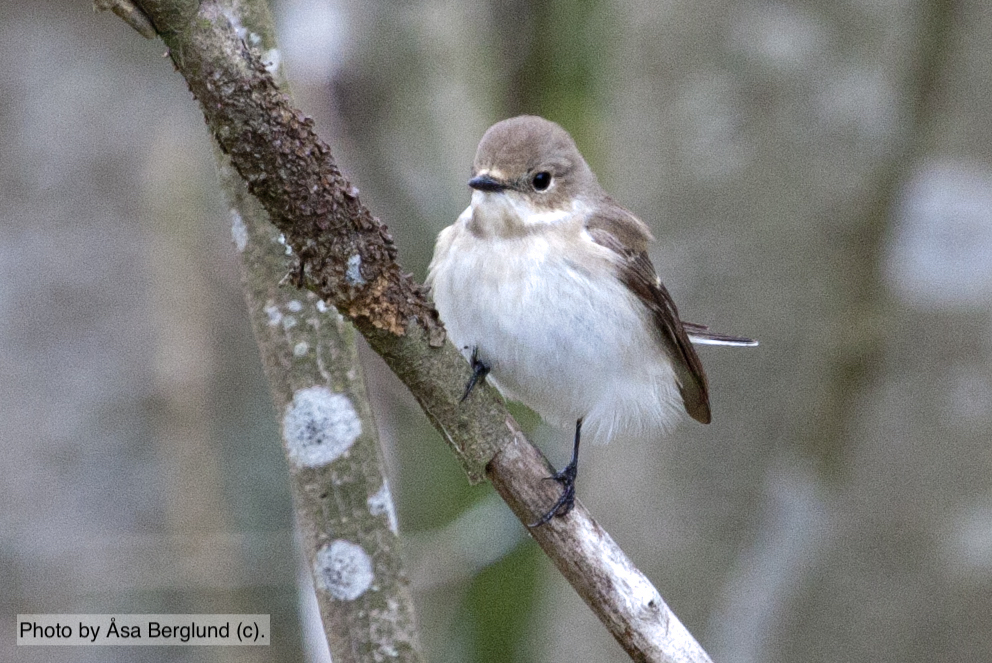Andelar holkhäckande svartvit flugsnappare Ficedula hypoleuca som återvände till häckningsplatsen i fjällbjörkskog i Lappland, 1965–2018
DOI:
https://doi.org/10.34080/os.v29.20019Nyckelord:
predation, häckningsframgång, hemortstrohet, överlevnad, tättingAbstract
Return rates of 4,178 female and 1,565 male breeding Pied Flycatchers ringed in 1965–2017 were studied near the species’ upper elevation and climatic limit in northern Sweden. Female return rate was 7.5% in the season subsequent to the first breeding season. Having returned once, 37% continued to return the next three seasons. Corresponding return rates of males were 27% and 39%. Female return rate decreased with more than 30% during the study period whereas that of males did not decrease. This difference was probably due to increased mortality during the non-breeding season that selectively struck females after the 1970s. Local factors affected return rates in both sexes. Return rate was positively correlated with breeding success in females but negatively in males, whereas it was correlated with nest-predation in the opposite way. Predation by mustelids accounted for a significant part of female return rate. Females that had returned once were continuously faithful to the former breeding site. Males showed faithfulness only after having returned twice.
Nedladdningar
Referenser
Askenmo C. 1979. Reproductive effort and return rate of male Pied Flycatchers. American Naturalist 114: 748–753. https://doi.org/10.1086/283523 DOI: https://doi.org/10.1086/283523
Chernetsov N, Sokolov LV & Kosarev V. 2009. Local survival rates of Pied Flycatchers Ficedula hypoleuca depend on their immigrant status. Avian Ecology and Behaviour 16: 11–20.
Enemar A, Sjöstrand B, Andersson G & von Proschwitz T. 2004. The 37-year dynamics of a subalpine passerine community, with special emphasis on the influence of environmental temperature and Epirrita autmnalis cycles. Ornis Svecica 14: 63–106. https://doi.org/10.34080/os.v14.20236 DOI: https://doi.org/10.34080/os.v14.20236
Haartman L von. 1951. Der Trauerschnäpper. II Populationsprobleme. Acta Zoologica Fennica Vol. 67.
Järvinen A. 1993. Spatial and temporal variation in reproductive trait of adjacent northern Pied Flycatcher Ficedula hypoleuca populations. Ornis Scandinavica 24: 33–40. https://doi.org/10.2307/3676407 DOI: https://doi.org/10.2307/3676407
Kern M, Slater F & Cowie R. 2014. Return rate and dispersal distances of Welsh Pied Flycatchers Ficedula hypoleuca and that influence them. Ringing & Migration, 29: 1–9. https://doi.org/10.1080/03078698.2014.932617 DOI: https://doi.org/10.1080/03078698.2014.932617
Leivits A & Vilbaste H. 1990. Breeding area fidelity and natal dipersal of the Pied Flycatcher in south-west Estonia. In Viksne J & Vilks J. (eds): Baltic Birds 5. Proceeding of the fifth conference on the study and conservation of migratory birds of the Baltic Basin 1: 254–257.
Lundberg A & Alatalo RV. 1992. The Pied Flycatcher. T & AD Poyser, London.
Nilsson J-E. 2008. A 20-year study of a nest box breeding bird population with special regard to the Pied Flycatcher Ficedula hypoleuca. Ornis Svecica 18: 52–64. https://doi.org/10.34080/os.v18.20235 DOI: https://doi.org/10.34080/os.v18.20235
Nyholm NEI. 1984. Polygyny in the Pied Flycatcher Ficedula hypoleuca at Ammarnäs, Swedish Lapland. Annales Zoologici Fennici 21: 229–232.
Nyholm NEI. 1986. Birth area fidelity and age of first breeding in a northern population of Pied Flycatcher Ficedula hypoleuca. Ornis Scandinavica 17: 249–252. https://doi.org/10.2307/3676834 DOI: https://doi.org/10.2307/3676834
Nyholm NEI. 2011. Dynamics and reproduction of a nest box breeding population of Pied Flycatchers Ficedula hypoleuca in a subalpine birch forest in Swedish Lapland during a period of 46 years. Ornis Svecica 21: 133–156. https://doi.org/10.34080/os.v21.20232 DOI: https://doi.org/10.34080/os.v21.20232
Nyholm NEI. & Myhrberg H. 1983. Breeding area fidelity of the Pied Flycatcher Ficedula hypoleuca at Ammarnäs, Swedish Lapland. Ornis Fennica 60: 22–27.
Sanz JJ. 2001. Latitudinal variation in female local return rate in the philopatric Pied Flycatcher (Ficedula hypoleuca). Auk 118: 539–543. https://doi.org/10.2307/4089818 DOI: https://doi.org/10.1093/auk/118.2.539
Winkel W. 1982. Zum Ortsteue-verhalten des Trauerschnäppers (Ficedula hypoleuca) im westlichen Randbereich seines mitteleuropäischen Verbreitungsgebietes. Journal für Ornithologie. 123: 155–173. https://doi.org/10.1007/BF01645055 DOI: https://doi.org/10.1007/BF01645055

Downloads
Publicerad
Referera så här
Nummer
Sektion
Licens
Copyright (c) 2019 N Erik I Nyholm

Det här verket är licensierat under en Creative Commons Erkännande 4.0 Internationell-licens.
Författaren/författarna innehar copyright för varje enskilt bidrag, men samtliga bidrag är publicerade under en Creative Commons-licens, så att vem som helst kan dela och återanvända bidraget förutsatt att copyright-innehavaren erkänns.







